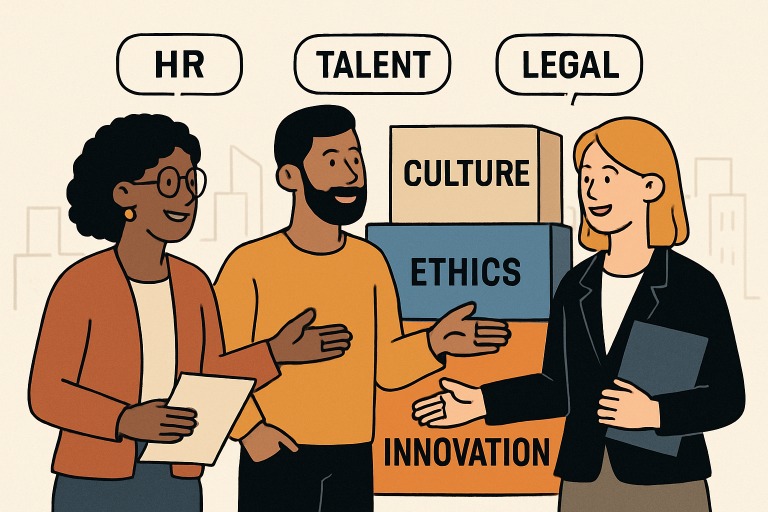How People, Talent, and Legal Teams Are Transforming Company Culture
Workplace Culture: More Than Just a Buzzword
In today’s fast-paced business world, workplace culture is far more than an employee perk or a buzzword. It’s a critical differentiator that attracts high-performing professionals, encourages innovation, and drives bottom-line results. A positive company culture increases job satisfaction, with over 80% of employees reporting that workplace culture is a crucial factor in choosing where to work, as the Society for Human Resource Management (SHRM) reported. Leading businesses are recognizing that to thrive in competitive markets, they need cultures that are inclusive, purpose-driven, and built on trust.
As organizations shift their priorities, the role of HR executive recruiters becomes even more strategic. These professionals bridge the gap between executive leadership and the evolving expectations of today’s workforce, ensuring companies can identify, hire, and retain talent embodying core values and forward-thinking approaches. This talent-centric mindset and comprehensive legal oversight form the backbone of a resilient and future-ready company culture.
The Shifting Role of People, Talent, and Legal Teams
Historically, people, talent, and legal teams were seen as separate entities primarily focused on compliance, payroll, and risk mitigation. Yet their roles have become more intertwined and influential in a rapidly evolving business landscape. Rather than operating in isolation, these departments now work as proactive change agents—integral partners in guiding organizational growth, employee engagement, and brand reputation.
The most forward-thinking companies empower these teams to shape policies, refine hiring practices, and champion diversity and inclusion initiatives. Their cross-disciplinary expertise brings fresh perspectives to decision-making, ensuring organizational agility and legal compliance in equal measure.
Driving Ethics and Inclusion Across the Organization
With greater visibility comes greater responsibility for people, talent, and legal teams to create workplaces where ethics are embedded into every layer of the organization. No longer just about rule enforcement, legal professionals play a key role in drafting policies that define behavioral standards and prevent discrimination. As the Forbes Business Council highlighted, ethical leadership strengthens engagement, instills a sense of belonging, and reduces costly turnover.
These teams collaborate extensively, moving beyond simple compliance toward creating environments where dialogue, transparency, and mutual respect are the norms. This organizational commitment to ethics and inclusion protects the company from legal risk and builds internal trust and external brand credibility.
Integrating Technology for a Modern Workforce
Digital transformation is redefining how HR and legal teams operate. Organizations automate tedious processes like applicant tracking, background checks, and benefits administration by harnessing comprehensive human capital management systems. Automation minimizes manual errors and provides real-time analytics, empowering leaders to make data-driven decisions quickly.
The most innovative organizations blend tech efficiency with human insights. From AI-powered onboarding that adapts to each new hire’s needs to learning management platforms that offer upskilling opportunities, technology now enables personal and professional growth. It equips people, talent, and legal teams with the tools to adapt rapidly while maintaining compliance.
Data-Informed Decision Making in People Practices
Data lies at the heart of next-generation HR and legal strategies. Advanced people analytics measure employee engagement, track retention rates, and anticipate workforce needs. For example, analyzing exit interviews and engagement surveys can reveal patterns that help organizations resolve issues proactively.
Legal teams utilize these data-driven insights to update policies and identify compliance vulnerabilities before they become major concerns. This shared reliance on measurable outcomes helps organizations differentiate between assumptions and actionable realities, driving meaningful improvements in culture and performance.
For additional insights into how data is transforming talent management, major publications like Harvard Business Review have explored the real-world impact of people analytics on company culture and workforce planning.
Remote Work and Its Impact on Policy and Culture
The rise of remote and hybrid work has compelled organizations to rethink how they sustain community and accountability. Adapting policies for geographically dispersed teams demands more than laptop stipends or home office allowances—it requires ongoing investment in communication, transparency, and feedback.
- Regular virtual check-ins to maintain team cohesion and engagement
- Use of digital HR platforms for streamlined access to legal and HR resources
- Updated remote work policies that account for multi-jurisdictional legal requirements
Leaders who prioritize flexibility and trust—while reinforcing clear expectations—foster resilient cultures that transcend physical locations. As reported by CNN Business, the evolution of remote work policies continues to impact organizational culture and how employees engage with their work.
Benefits of Cross-Functional Collaboration
Achieving true culture transformation means breaking through traditional silos. When people, talent, and legal teams collaborate, they unite expertise from multiple areas—compliance, hiring, development, and policy—and foster innovative solutions that propel the organization forward. Such collaboration ensures consistent messaging, values-driven decision-making, and proactive risk management.
Keys to Success
- Regular interdepartmental meetings for information sharing
- Shared objectives aligned with organizational mission
- Transparent processes that foster trust across teams
Cross-functional partnerships help reduce costly miscommunications and support a more agile and responsive organizational structure.
Anticipating Future Trends in Culture and Compliance
The pace of workplace evolution shows no signs of slowing. In the coming years, expect even more attention to holistic employee well-being, increased legal oversight of distributed workplaces, and the integration of artificial intelligence into every stage of the employee lifecycle. Companies that are prepared to pivot quickly while staying true to ethical standards and compliance will be best positioned for sustainable success.
Forward-thinking organizations will continue investing in learning, technology, and talent while monitoring emerging legal risks. By cultivating adaptable cultures, they ensure they remain attractive to top talent and resilient in the face of change.
Conclusion
People, talent, and legal teams are fundamental to building cultures where individuals can thrive and companies excel. Their voices guide not just compliance, but the very heart of the employee experience. Through collaboration, data, and a commitment to ethical values, these teams transform workplaces—setting the stage for innovation, engagement, and long-term organizational success.







